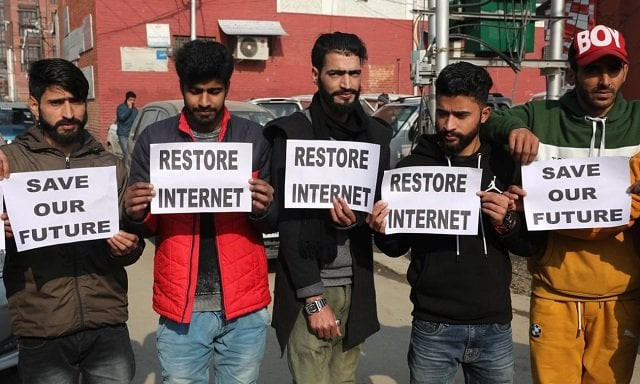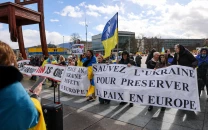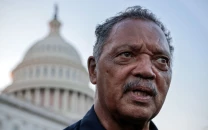Over 150 days of agony: Kashmiris suffer longest internet blackout ever
With several calamitous impacts, internet shut-down in IOK has cost lives; how many, doctors say they will never know

With several calamitous impacts, internet shut-down in IOK has cost lives; how many, doctors say they will never know. PHOTO COURTESY: THE GUARDIAN
The controversial decision by Modi-led government to revoke Occupied Kashmir’s constitutional autonomy and split it into two territories under the control of the federal government was followed by a series of militaristic measures.
Tens of thousands of troops moved in, former chief ministers, legislators and Kashmiri leaders were detained, curfews and travel restriction were imposed and all communication methods, including phone access to the internet, was cut off. While the crackdown has eased, many restrictions remain — inciting havoc in the disputed region.
The impact of the shutdown in Occupied Kashmir has proved calamitous to the economy, crushing innovation in the region and leading to a mass exodus of young people in search of new jobs.
But above all, it has cost lives; how many, doctors say they will never know.
In the Himalayan region, where mountainous terrain and archaic road networks mean travel can often take days, patients suffering from cardiac emergencies often don’t have access to specialist doctors or major hospitals in time. But through a volunteer network named ‘Save Heart Kashmir’, 1,200 doctors across the region were connected to each other through four groups on WhatsApp — the instant internet messaging app — where they shared reports of cardio emergencies and sought instant diagnosis.
“It was the best virtual hospital and doctors were united by WhatsApp,” said a 43-year-old doctor, Imran Hafeez, proudly recounting dozens of cases where a WhatsApp group saved millions of lives.
Over the 500 days it was running, the group operated round the clock and analysed 38,700 ECGs, handled 19,395 cases and administered thrombolysis 778 times to clear blocked veins.
“We definitely saved lives and it was going very well until everything broke down. I don’t know how many patients we have lost, but patient care has definitely suffered,” Hafeez shared.
Similarly, the five months on internet suspension has left Shayan Nabi in despair who was once the proud owner of a small start-up company, named Harmukh Technologies.
The company, which ran online advertisement campaigns for domestic and foreign clients, was among the many casualties of the blockade as business was impossible without internet access.
“I want to go home, but then what will I tell my family?” Nabi, 30, asked as he searched for future options in New Delhi, 500 miles away.
“I left a bank job for this, I dropped out of MBA for this, because I wanted to do something of my own,’’ said Nabi. “But more than being angry I feel helplessness: what can I be angry about and against whom?”
The toll has not only been economic. A software programmer working in a Srinagar-based tech company, described the experience as an “emotional hell”
“We had no contact with our families and even our families had no information if we are alive or not,” he said.
Sheikh Ashiq, president of the eight-decade-old Kashmir Chamber of Commerce and Industry, said the losses incurred by the region due to the internet shutdown are estimated to be well over £1bn.
“We live in a world with an internet-based economy and we live in a place where there’s no internet. While people all over world over wished each other happy new year, we couldn’t even send a simple text to anyone, “he added.
It is unclear when the Indian government intends to allow full internet access in the region.
However, this week, SMS services were restored, and 80 government hospitals were given access. Although there are more than 1,000 private hospitals and medical facilities still unable to connect to the internet, which doctors say has severely affected treatment and access to medicines for patients.
According to media reports, India now holds the inglorious title of being the internet shutdown capital of the world.
With a record of shutting internet 106 times last year, New Delhi is not only damaging to freedom of expression but an economically costly tool of repression since Indian mobile operators lose about Rs24.5 million in revenue every hour they are forced to suspend internet services.
The story originally appeared on The Guardian



















COMMENTS
Comments are moderated and generally will be posted if they are on-topic and not abusive.
For more information, please see our Comments FAQ